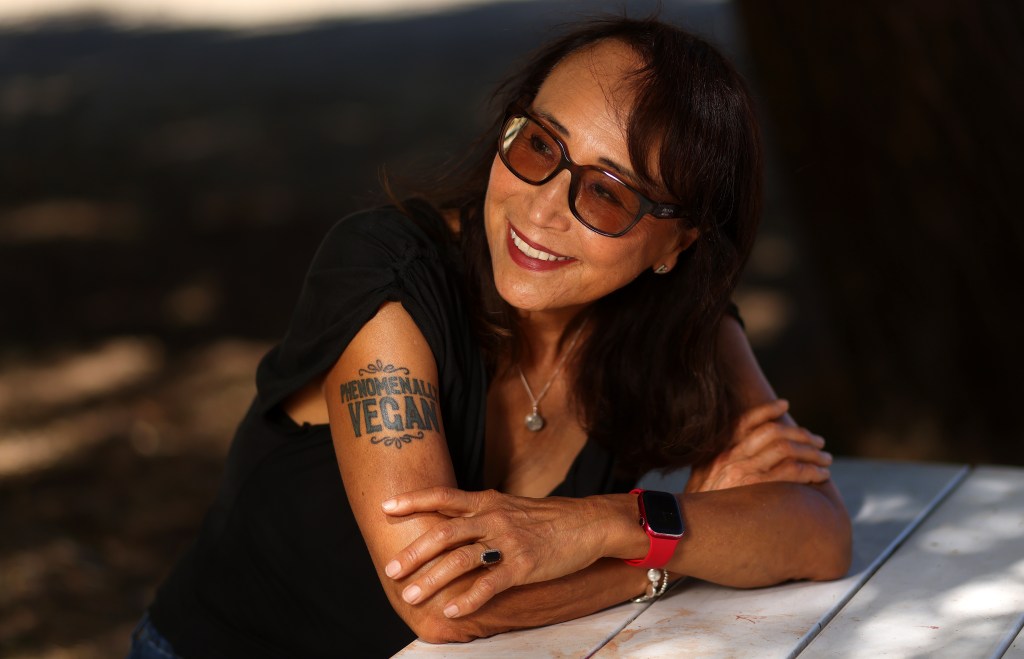Miyoko Schinner, a trailblazer in the vegan food movement, is redefining traditional dairy products through her latest cookbook, “The Vegan Creamery.” Released on September 16 and priced at $27, the book is packed with inventive recipes that transform plant-based ingredients into alternatives for cheese, milk, and ice cream. Schinner, the founder and former CEO of Miyoko’s Creamery, has built a reputation for creativity in vegan cuisine and is eager to share her expertise.
In addition to her culinary endeavors, Schinner founded Rancho Compasión, a nonprofit farm animal rescue located in Nicasio, California. Although she was ousted from her role as CEO in June 2022, her passion for plant-based innovation continues to flourish.
We spoke with Schinner about her motivation for writing this cookbook, her culinary journey, and the intersection of her work in vegan food and animal rescue.
Exploring Kitchen Sovereignty
Q: What inspired your new cookbook?
A: “We are in an evolutionary period where food is rapidly changing. One of my concerns is the corporatization of the food system in America and worldwide. About 70% of our calories today come from ultra-processed foods, mostly from one of 10 multinational corporations. Some people are in love with cooking, but oftentimes that cooking still entails buying a lot of products and then assembling them. The ability to understand where our food comes from and to prepare it for ourselves and our community is a huge part of who we are as humanity. I focus on ‘kitchen sovereignty,’ which is all about people getting back in the kitchen and learning about food. This is what we did for thousands of years, and in the last century, we have lost that ability. It’s frightening because if we don’t have a corporation selling something in a package, most people no longer know how to make it.”
Passion for Food and Cooking
Q: How did your passion for cooking develop?
A: “My passion for food started when I became a vegan in my mid-20s. I worked through Julia Child’s ‘Mastering the Art of French Cooking’ and tried to veganize the recipes. Living in Japan, I learned to appreciate umami flavors from ingredients like shiitake and miso. The blend of Eastern and Western culinary techniques sparked my creativity.”
Diving Into Vegan Cheese
Q: Why did you focus your cookbook on vegan cheese?
A: “I’ve written about vegan cooking before, but this book represents my deeper conviction regarding the food system that has been developing for decades. The idea of crafting dairy products from plants is relatively new and has seen minimal exploration historically. My goal is to delve into the science behind plant-based cheese-making, exploring which plant milks yield desirable flavors and textures. I believe it’s crucial to advance this knowledge, and rather than patenting my findings, I want to democratize food and empower others to explore this exciting realm.”
Inspiring a New Generation of Cheese Makers
Q: Who do you hope will adopt the recipes from your cookbook?
A: “If Helen of Troy launched a thousand ships, I hope this book will inspire a thousand vegan cheese producers. I’ve witnessed small vegan cheese producers thrive after exploring my previous works, and I want to contribute to a movement that reduces reliance on animal products for environmental reasons. It’s key to provide these alternatives to promote sustainability.”
The Recipe Development Process
Q: What is your process for developing recipes?
A: “I conduct multiple experiments to understand why a recipe works—or doesn’t. For instance, in my blue cheese recipes, I initially used only coconut oil, believing it enhanced the flavor. But when I tested it without oil, the flavor was absent. Research revealed that coconut oil triggers crucial flavor compounds. I constantly probe the ‘why’ in my creations, even without a formal food science background.”
Celebrating a Decade of Animal Rescue
Q: How did Rancho Compasión start?
A: “It began almost accidentally. I moved to West Marin, and someone asked me to look after some stray goats temporarily. I quickly fell in love with them. Soon after, I took in pot-bellied pigs, and within months, I had a growing menagerie of animals. We organized as a nonprofit and expanded our programs over time. Now, we have educational initiatives for youth, including after-school programs and summer camps. Kids learn to connect with animals and participate in growing food, which ultimately fosters peace and understanding.”
Connecting Food Practices with Animal Welfare
Q: How do your animal rescue efforts connect to your culinary work?
A: “Many kids have no idea where their food comes from, especially during gardening activities. Teaching them to grow food sparks enthusiasm; during summer camp, I witnessed children returning for seconds of healthy meals. This work emphasizes the importance of understanding the food system in a holistic manner that is beneficial for humans, animals, and the planet.”






